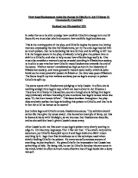Othello coursework
Discuss the significance of Act III sc. iii with particular reference to how Shakespeare creates dramatic tension
Act III sc. iii is one of the most important acts in the play because in one scene, Othello goes from being a happily married man, at the start, to being, by the end, a man who isn’t in control and is getting confused and doesn’t know what’s going on. In this scene we also witness a devastating display of manipulation of Othello by Iago and the downfall of Cassio.
One of the ways in which Shakespeare creates dramatic tension is by Othello using very short questions such as “What dost thou say?” and “What dost thou think?” and “What dost thou mean?” which indicate that is he slowly becoming more and dependent on Iago and relying on what he is thinking as he has no previous experience of Venetian society-this is shown where Iago says “In Venice, they do let God see the pranks they dare not show their husbands” which is a reference that Venetian women go behind their husband’s backs a lot and their husbands don’t know about it. Othello also uses a lot of short sentences such as “O misery” and “Ha?” and could indicate anger and also that he is not thinking clearly and that, because he is black and a ‘moor’, not fluent with the language and feels ill at ease and he can’t fit in with the rest of society and feels an ‘outcast’ and so might be more prone to Iago’s lies and deceit than anyone else.
Another way that Shakespeare creates dramatic tension is Iago saying long, fluent sentences which juxtaposes Othello saying short sentences. One example of this is where Iago says “My Lord, I would I might entreat your honour to scan this thing no further: Leave it to time” compared to Othello saying “I will not” which seems inadequate and out of place. These, together with Iago’s soliloquies such as on Pg.84 Ln. 9 where he starts to plot about leaving the handkerchief in Cassio’s quarters - “I will in Cassio’s lodging lose this handkerchief” present Iago as being extremely confident and subtle and that he has a scheming, plotting mind. Also, Iago speaks in riddles which make him more dominant in the scenes and Othello often can’t understand what he is saying.

This is a preview of the whole essay
Peer Reviews
Here's what a star student thought of this essay
Quality of writing
This essay has a clear introduction, and a clear conclusion. These both weave the argument together, but unfortunately the rest of the essay has a poor structure. I feel as if this essay is simply listing points. This is evident through the first sentence of each paragraph. For example "One of the ways", "Another way" and "Another method that" doesn't show any craft, and hinders the examiners ability to distinguish between points. If I were answering this question, I would be signposting paragraphs with sentences such as "Shakespeare uses the repetition of Othello's language to show his desperation, thus creating tension within the scene". This shows that I am focused on the task, and doesn't seem as if I am simply listing. The style is also questionable here, with syntax being a problem. For example "The scene is the central scene throughout the play and is the longest, tensest scene" has a number of errors and doesn't show the examiner that this is an abled candidate.
Level of analysis
The analysis in this essay is sound. What I liked in this essay that is often absent from GCSE essays is the reference to Othello and Iago being Shakespeare's constructions. This is evident when the essay tells "in which Shakespeare creates dramatic tension is by Othello using very short questions". I would, however, make this more explicit by rewording the sentence. I would say "Shakespeare has Othello use short sentences to create dramatic tension". At times this essay goes back to simply saying "where Iago uses the form of address" which is a shame, as it showed potential. It is key to show the examiner that you are aware these are Shakespeare's constructs, as it allows you to focus on why he has created them for dramatic effect. Language is analysed well, but sometimes the points are irrelevant. Yes, the essay picks up the use of plants in the scene, but it isn't necessary to the question. There is a skill in making sure you write about the good points, such as Iago's use of poison imagery, and unfortunately this essay doesn't display this.
Response to question
This essay responds well to the question. There is a clear focus on the significance of the scene in creating dramatic tension, rather than simply retelling the plot. This is good, as many essays at GCSE level will think they are being tested on their knowledge of the play, meaning they don't analyse language, form and structure and fail to build an argument. I liked how the essay comes to the conclusion saying that the scene is central, with the use of this critical language showing the ability to form a justified judgement. I would've liked to have seen tragedy explored, as this is a scene whereby the audience are identify the beginning of Othello's downfall.







